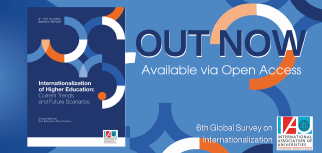
The 2024 internationalization survey report “Internationalization in Higher Education: Current Trends and Future Scenarios”, prepared by the International Association of Universities (IAU), sheds light on key trends in global higher education, focusing on internationalization strategies and their impacts. As a member of the IAU, Collegium Civitas is proud to contribute to this comprehensive analysis.
The report underscores Europe’s critical role in internationalization, with a notable trend towards regionalization across various regions. It reveals insights into funding sources for international activities, emphasizing the reliance on general institutional budgets across regions and highlighting the unique significance of international organizations and foreign government funding, particularly in Sub-Saharan Africa.
Recruitment and promotion policies are analyzed, reflecting nuanced views on the importance of international experience and foreign language proficiency among academic and administrative staff, with regional differences in emphasis. Priority internationalization activities vary, with student mobility and international research collaboration emerging as common focal points, although priorities may differ by region.
Moreover, the report discusses the evolution of internationalization strategies, noting an increasing trend in having a policy or strategy and the establishment of dedicated offices or teams for implementation. It highlights the changing landscape of internationalization’s geographic priorities, funding sources, and the shift towards more inclusive and comprehensive approaches.
Addressing challenges and obstacles to internationalization, such as financial constraints and visa restrictions, the report also explores strategic responses to accommodate refugees and migrants in higher education.
In conclusion, the report offers insights into a complex and evolving internationalization landscape, marked by varying regional priorities, the growing importance of comprehensive strategies, and the challenge of aligning with sustainable development goals. We encourage you to read the whole report .

